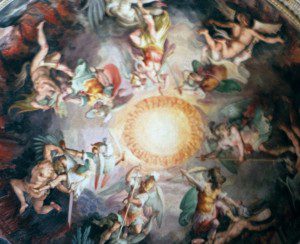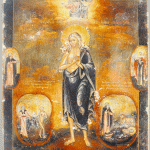Note: this post and a previous one, On the Virtuous Life: The Good of Chastity in Marriage and in Celibacy were originally written as one piece, before I noted that the length required it to be split into two separate posts. I’ve tried to make each post able to be read on its own, making for some overlap between the two, but they are still best if read together.
Marriage was not established so that any and all forms of sexual pleasure could be made licit in the marriage bed. Sexuality can be embraced as a part of the way of holiness, but in doing so, it must be guided by the principles which guide any and all virtues. There can be, and often are, questions and answers given as to what is acceptable and what is not acceptable for a holy way of life. What these questions are, and the answers to them, while invaluable, are not our interest here. Rather, we want to look beyond them, beyond the letter of the law, and to the spirit, the reason why the law is established in the first place. Many treat rules and regulations as external impositions which prevent us from being true to ourselves, and to be sure, the way many use them, this is often the case. But when talking about holiness, the rules reveal sin, showing us what will hinder us and our pursuit for perfection, and it is in and with that perfection do we find true freedom, the freedom that those who fight against rules and regulations in their life would also like.
When virtue is looked only within the domain of ethical questions, and the rules or laws established through the pursuit of those questions, it is understandable why so many only look to those rules as the foundation for their life. Where no rules are established, they believe they do not have to consider any restriction on their way of life and so enter into all kinds of libertine notions for themselves and their desires while being critical and legalistic of those who do not follow the rules as they have been established. They believe that their passionate desires, so long as no external rule can be found against them, can be followed without limit, without restriction, often not realizing that the same rules they give out to others would have implications in their own lives if they but reflected upon the basis of the rules themselves.
And so some will acknowledge that in marriage, not all forms of possible sexuality are good, because the rules say so, and they will legalistically obey those rules while violating the spirit of them as they pursue their lust insofar as the rules allow. Likewise, the spirit of the law, which is about finding a way to overcome our slavery to our inordinate passions, is not understood, so that the virtue expressed in various sexual codes is not understood to be seen analogously in other walks of life. Their sexuality might be restricted, but other parts of their life which needs some form of self-discipline imposed upon them find none because they know no positive rules which tells them to become disciplined in such a fashion. If there is no longer a rule which designates how you should fast on a certain day, then not only do they feel we need not fast on that day, we are free to eat and drink to excess.

The eight deadly sins “gluttony, unchastity, avarice, anger, dejection, listlessness, self-esteem and pride,”[1] remain ever before us, challenging us, tempting us, and must be fought at all times, being countered by the virtues which they contradict. We might not become great in all of the virtues, but we should recognize them and embrace them all in our daily life. We must not excuse the vices just because we have not been given specific regulation as to how to fight them off. We are told they are vices. We are told what the great virtues are. We are to seek after virtue, to put the virtues in practice, and to recognize where we are weak and admit our weakness instead of finding excuses to justify our vices.
The problem, then, is that many in our day and age with a legalistic mindset get so caught up on chastity, and sexuality as a whole, that they forget the whole of the spiritual life. They ignore the holistic approach to virtue but think only things which deal with sex and sexuality are what matters. This is why they end up seeming to be prudish instead of wise. They try to dictate their own self-discipline in sexuality as the end all of morality, while ignoring and even mocking those who might fail in sexual virtue while finding themselves growing in and with many other virtues. In doing so, such condemnation ultimately leads back to the one making themselves so self-righteous; often, once they believe they have perfected themselves they will find even the virtue they thought they had, sexual purity, was not theirs as they fall for and debase themselves by giving in to some sexual vice.
And so there are many other virtues we can, and should, explore; while not ignoring any of the virtues, each person should be focusing on one virtue at a time, until they have been mastered by it, allowing them to take what they have gained and apply it in pursuit then of other virtues.[2] They should recognize their own weaknesses, and go forward in humility, realizing whatever good they have attained has come, in part, from the grace of God and not apart from it, realizing then what distinguishes them from others is less than what they have been given by God. When they are weak and stumble in some regard, because they are meek and humble, grace will be sufficient – but if they slowly follow the path of self-righteousness based upon any particular virtue they have mastered, then they lose all when their righteousness is proven unstable in regards to those virtues they have not perfected. Sexual sin is a weakness, and can be a grave fault, but on the other hand, a humble and contrite person struggling against temptation, even if they fall, will find they are not cast aside but instead gracefully picked up by the hand of God. We must not concern ourselves with the temptations and weaknesses of others; even if they stumble and fall all the time, we do not know the extent of their temptation and what graces they are slowly gaining from it all; they could be healing over from the inside-out and only in the end the virtues they have gained will shine through, but on the other hand, if we think we can judge them, we often will find God will take us aside and cause us to suffer the temptations of others, to show what he is building in them, hoping to humble us and treat them with love and respect instead of abusing them with condemnation. [3]
When we learn, therefore, that there is freedom established in virtue, not imprisonment, we begin to look at sexuality and other virtues differently. Chastity is about freedom, freedom from being put under control of sex and the sexual urges, while sexual addiction is the reverse, the enslavement to the passion itself. But this true with all virtues. They aim at bringing us to perfection and in that perfection, enlarging our will and our freedom to act.
We must therefore realize that our pursuit for virtue and our fight against some vice is not to be centered upon our sexuality and questions of sexual ethics. We must explore virtue in other aspects of our life, such as in our economic activity. Just as we cannot assume anything is permissible in marriage, so we cannot embrace greed and justify it because we are given freedom in Christ. We must not justify our excessive taking from others, ignoring that we are called to give and not take; we must love those who need our help instead of looking at their pains and sorrows as ways we can gain a profit. If we take the world unto ourselves and try to control it instead of being its good steward, our charity is lacking and whatever other virtues we might have pursued are overcome by this lack of charity. Truly, without charity, we are nothing. Because the love of money is said to be the root of evil, it is not surprising that this vice, being one of the most common in society today, is leading to the destruction of many as they ignore its stain of corruption on their soul. Money attaches us to the goods of the world, and so to be focused upon money and to love it is to love the world in its unredeemed materialistic form, showing that in and through our greed, we have turned the world into an idol and avoid the absolute good of God, replacing it with the limited good of creation. And that good, in the end, will not last, as St. Basil wisely declared:
For if some were to amass gold in boundless measure in this life, not even then does it remain their personal possession in perpetuity. Despite all their efforts to secure it, either it deserts them while they are still alive by passing over to those more powerful, or it abandons them at the point of death, not being accustomed to depart along with those who owned it. Those dragged to that inescapable road by the One who forcibly separates our souls from this miserable flesh, turn back time and again to their riches and bewail the sweat expanded upon them from their youth. But their wealth has eyes only for the hands of others, after inflicting upon them nothing but the toil of gathering and the crime of avarice. If someone were to possess upon the earth thousands of acres, and magnificent homes, and herds of every kind of animal, and to exercise absolute authority among men, not even then would he enjoy them forever.[4]
Sadly, so many who see themselves are pure because of their sexual discipline hide from themselves their true vices, and so with so many attached to money, they fail to see how the parasite of greed has destroyed them from the inside out. They are not holy, but only present themselves as such. It would be better if they had focused on charity and humility and went to God for mercy than acted as they were morally superior when they were not. Obviously, the reverse can be true; someone focused on lack of material goods and yet giving in to lust and other vices as if they were nothing will suffer just the same. It is humility combined with the pursuit of virtue in a holistic fashion which is needed.[5]
We can see the truth of this also in relation to other virtues, as for example, temperance in relation to gluttony. Our society loves the notion that all things are permissible in regards to food. We eat, we gorge ourselves, and think nothing of it. We want it, we should have it. It is a part of our freedom. And Christians, we are told, are free to eat whatever they want, for it is not what comes in but what goes out which is impure. As is the case with so many vices, there is truth which is being distorted by exaggeration; if we are concerned about the defilement of what comes out of us, more defilement will come the more we eat, showing that truly such a response is not indicative that we are free to gorge ourselves to excess. And most people understand why human flesh is itself forbidden, so that when Peter is told that Jewish purity rules no longer apply to Christians (cf. Acts 10:13- 15), this does not mean he is free to eat human flesh if he so desires. Likewise, therefore, there are still restrictions to our eating habits, but they are no longer based upon the Mosaic law. We can and will still fast, as Jesus said we would (cf. Matt. 9:15). We are not to gorge ourselves with excessive eating and drinking, and to make sure we do not, we can find various disciplines put in place to help follow temperance.
Adam’s sin, it has been said, was founded, in part, with gluttony – he gave in to gorging, to follow his stomach and its desire; and so to fight against the promptings of the stomach, to seek to transcend it by keeping only to our needs, is itself a way to engage virtue. Fasting is a discipline for all of us from time to time, as it teaches us self-discipline, showing us how we can and must act beyond the mere promptings of the body. Therefore, for some, this fight against gluttony will be where they find God is calling them, to use it as the foundation for their path of virtue; they might engage fasting, not to extreme denial of the body’s needs, but for denial of its desires. They might limit what they eat, the kinds of food they eat, in order to live in a more charitable way to others and to the world around them, and so they might, for example, become vegetarian without demanding others to do the same. Those who would mock vegetarians for not giving in to all the delights of the flesh often include those who otherwise will defend the virtue of celibacy showing they do not get the virtue they claim they support. Of course, others will punish celibates but praise vegetarians, with the same kind of hypocrisy. What is honorable about those who voluntarily become vegetarian is that they seek to discipline themselves and use it as a way to embrace the good of fasting in a way which extends beyond the fasting period, realizing the fasts are meant only to be the bare minimum discipline they are expected to follow.
The key for all of us is to find those areas of self-discipline which we can engage as a means of developing our virtue and taking what we learn from our virtue into all our walks of life. We should always have charity as the foundation for our pursuit of virtue; we must not seek to do such works with the belief that such works are the end in and of itself. Each particular virtue, with the heroic levels of virtue possible with them, are good but not good in and of themselves without a willingness to engage all of the virtues in union with the grace of God. We must not demand all to follow and pursue the same virtue, nor assume by itself, a heroic level of virtue in one virtue means someone is holy. Each person has their calling, their special way of life, their special virtue which they should develop, but no vice should be accepted as a result. We should still seek at least limited attainment of all virtues through various forms of self-discipline in our lives, so that the vices are countered in our pursuit of our special virtue . That is what is expected. We are not all going to seek the same forms of virtue. We are not going to even attain the same level of holiness in our life. This is fine. And this is why in the end we should find ourselves encouraging others in their specific virtues, at the potential they have for them, instead of discouraging them by demanding they embrace our walk of life and become just like us.
[1] St. John Cassian, “On the Eight Vices” in The Philokalia: The Complete Text. Volume One. trans. G.E.H. Palmer, Philip Sherrard and Kallistos Ware (London: Faber and Faber, 1983), 73.
[2] “Abba Anthony said, ‘Whoever hammers a lump of iron, first decides what he is going to make of it, a scythe, a sword, or an axe. Even so we ought to make up our minds what kind of virtue we want to forge or we labour in vain,” The Sayings of the Desert Fathers. trans. Benedicta Ward (Kalamazoo, MI: Cistercian Publications, 1984), 8.
[3] See, for example, the story related by St. John Cassian from St. Moses, which talks about how one young monk confessed to an elderly monk his trials and tribulations with lust. The elder monk ridiculed him, and had no respect for the temptation and how it was a trial for the young monk’s moral virtue. The young monk felt shame and thought about leaving the monastic community, until one Abba Apollo met up with him, talked with him, and reassured the young monk he was fine. Then Abba Apollo prayed that the elder monk could get a glimpse of the trials the young monk faced; the elder monk received it and could not handle it – he was acting, it is said, like a drunk man. When Apollo met with the elder monk, he told him that he had not been worthy of such temptation and it was why he did not face it before, and now that he knew how strong it was, he should be careful not to undermine the work God was doing in others. See The Book of Elders. Sayings of the Desert Fathers. The Systematic Collection. trans. John Wortley (Collegeville, MN: Cistercian Publications, 2012), 60-2.
[4] St. Basil the Great, “Homily on Detachment from Worldly Things,” in On Christian Doctrine and Practice. trans. Mark DelCogliano (Crestwood, NY: St. Vladimir’s Seminary Press, 2012), 168.
[5] Hence, the parable of the Publican and Pharisee, where any self-righteousness is rejected while the humble love of sinners is accepted by God. See Luke 18:9-14.
Stay in touch! Like A Little Bit of Nothing on Facebook:
A Little Bit of Nothing












